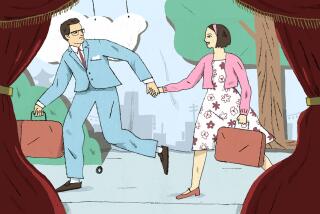‘The Story of a Marriage’ by Andrew Sean Greer
The Story of a Marriage
A Novel
Andrew Sean Greer
Farrar, Straus & Giroux: 196 pp., $22
“WE THINK we know the ones we love,” begins Andrew Sean Greer’s bewitching third novel, “The Story of a Marriage,” a book whose linguistic prowess and raw storytelling power is almost disruptive to the reader. It’s too good to put down and yet each passage is also too good to leave behind.
The story, which is told in retrospect, begins in 1953. Eisenhower and Nixon have just been sworn in and America is rebounding from World War II. It is a time when books can be rented from Macy’s, the seltzer boy makes house calls and, for those who don’t have a refrigerator, the ice man goes door to door.
This is the world of Pearlie and Holland Cook, a young couple living in a tiny, vine-covered house in San Francisco’s Outer Sunset, a quiet, fog-drenched residential district butting up against the Pacific as if it were teetering on the edge of the world. Unlike the rest of hilly San Francisco, the Outer Sunset is bare and flat, studded with simple, pastel-colored row homes -- a sleepy, gusty neighborhood where gritty specks of sand stick in the air and, in the early morning, one can hear the occasional apocalyptic roar of a lion from the nearby zoo.
Pearlie adores Holland, whose striking good looks have an almost grotesquely magnetic effect on strangers. She loves him “like a field on fire” and is a devoted housewife and doting mother to their small son. Then, one day, an elegantly dressed stranger shows up on their doorstep. He asks Pearlie a question that will send her placid daily routine and, in fact, her very worldview wildly off-course. He infiltrates the family’s lives for six emotionally charged months, then offers them $100,000 cash to make an unspeakable choice. Not much more can be revealed without ruining Greer’s crafty and addictive story. But, suffice to say, there is: an affair, an unexpected friendship, a letter that hits its recipient like a bullet, some tears and many secrets. Every 20 pages or so, the plot implodes and the characters reveal themselves. Again and again.
The point, of course, is that things are never as they seem. Especially in love and marriage. “We think we know them. We think we love them,” Greer writes. “But what we love turns out to be a poor translation, a translation we ourselves have made, from a language we barely know.”
To a large extent, “The Story of a Marriage” is a meditation on censorship, the pliable nature of memory and the limitless degree to which revisionist history -- both personal and political -- can be stretched. The 1950s, after all, are not just a time of nostalgic innocence. America is “full of worries about the Korean war, race issues, the Rosenbergs, the Communists . . . the Russian bombs.” Pearlie lives, herself, weighed down by self-imposed repression: She tiptoes around her handsome husband, who has, she says, “bad blood, a crooked heart.” She buys an alarm clock that purrs, a doorbell that “cooed like a mourning dove” and a barkless dog. (A barkless dog!) She censors the news for Holland, cutting out negative articles from the morning paper before he reads it, and she “silenced everything in [herself] that wasn’t mild and good.”
And yet, altering events is old hat to Pearlie. Years earlier, during the war, she served as a WAVE, penning what, unbeknownst to her, were reports on potentially suspicious behavior. Throughout, she took great liberty with what she wrote, fictionalizing the details of her life because she felt they were boring. “Like so many people,” she recalls, “I was deaf to my own stories. So I made them up.”
Even the way she and her husband come together is a play on memory. They meet twice -- first as kids in Kentucky and a second time in San Francisco, when a fuzzy-minded Holland, having just returned from the war, forgets not just Pearlie’s name but who she is. Twice in their lives, they are strangers. The story of a marriage.
Greer’s short novel feels admirably worked over -- like a long-simmered sauce. He near-brilliantly juxtaposes the nuances of love, sexual awakening and the sometimes suffocating sacrifices marriage demands against broader cultural observations about political turmoil, the physical and emotional effects of war, sexual repression and racism.
His book is a perfect mix of what we seek from literature -- captivating storytelling; a complex, finely tuned structure; stunning language; and astute observations about both the mundane intricacies of everyday relationships and society as a whole. Indeed, “The Story of a Marriage” is as much a war story as it is a love story. “It started as a love story . . . but the war has stuck to it everywhere like shattered glass.”
Nevertheless, Greer’s portrait of two individuals -- a marriage -- remains at the novel’s core. Anyone who’s ever been through a divorce or the death of a spouse can relate to Pearlie’s fathoming of life without Holland: “I wouldn’t just be alone in the present; I would be alone in my past as well, in my memories. . . . I would be like a traveler from a distant country that no one had ever been to, nor ever heard of, an immigrant from that vanished land: my youth.”
We may think we know the ones we love. We may think we know ourselves. But neither is really true. Or, ultimately, possible. It’s just the way of things. For Pearlie Cook as much as for ourselves. *
More to Read
Sign up for The Wild
We’ll help you find the best places to hike, bike and run, as well as the perfect silent spots for meditation and yoga.
You may occasionally receive promotional content from the Los Angeles Times.











